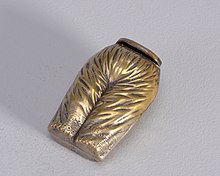Anthony Barbieri-Low | Paradisiacal Realms and Their Access in Ancient Egypt and Early China | Oct. 24 | 4:30 PM | Room 241, Rosenkranz Hall
「哈盆溪隨手一捧,就是滿手的台灣原生藻蝦。」記不清楚最早調查福山生態的植物學家徐國士是哪一年告訴我的,印象中,福山是個Paradise,可能是比 大武山自然保留區保護得還要好的生物基因庫。多年後終能造訪,福山不再神祕,但是「留客」能力竟然如此之強,讓人欲走還留。....... 福山的智慧不只是春夏秋冬,也不只是風雨晨昏,物種多樣性的共存,相互提攜,相互扶持,真讓人嘆是諾亞方舟!
借來的福山【聯合報2008.02.21╱卓亞雄】
With pristine beaches and exhilarating views, this tiny island is one of those famously paradisiacal places that actually lives up to the hype.
vesta
vesta の定義
HISTORICAL
名詞
1
a short wooden or wax match.
Vesta cases, or simply “vestas” are small boxes made to house wax, or "strike anywhere", matches. The first successful friction match appeared in 1826, and in 1832 William Newton patented the "wax vesta" in England [1]. It consisted of a wax stem with embedded cotton threads and a tip of phosphorus. Newton named his matches after Vesta, the Roman goddess of fire and the hearth.

Matchsafe, late 19th century, in the form of a pair of women's bloomers, featuring simulated creases and lace cuffs. Lid on top. Striker on lid.
paradisiacal
adjective
(of a place or state) ideal or idyllic; heavenly.
‘a paradisiacal island in the Bahamas’
‘paradisiacal innocence’
- Of or relating to heaven: celestial, divine, heavenly, paradisaic, paradisaical, paradisal, paradisiac. Seereligion.
paradise
-->

Wikipedia article "Paradise garden".
The Paradise garden is a form of garden, originally just paradise, a word derived from the Avestan language, or Old Persian. Its original meaning was a walled-in compound or garden; from pairi (around) and daeza or diz (wall, brick, or shape). The name has come to be commonly used in English and other European languages as an alternative for heaven. Because of the additional meanings for the word, the enclosed garden of the original concept is now often referred to as a paradise garden.



沒有留言:
張貼留言